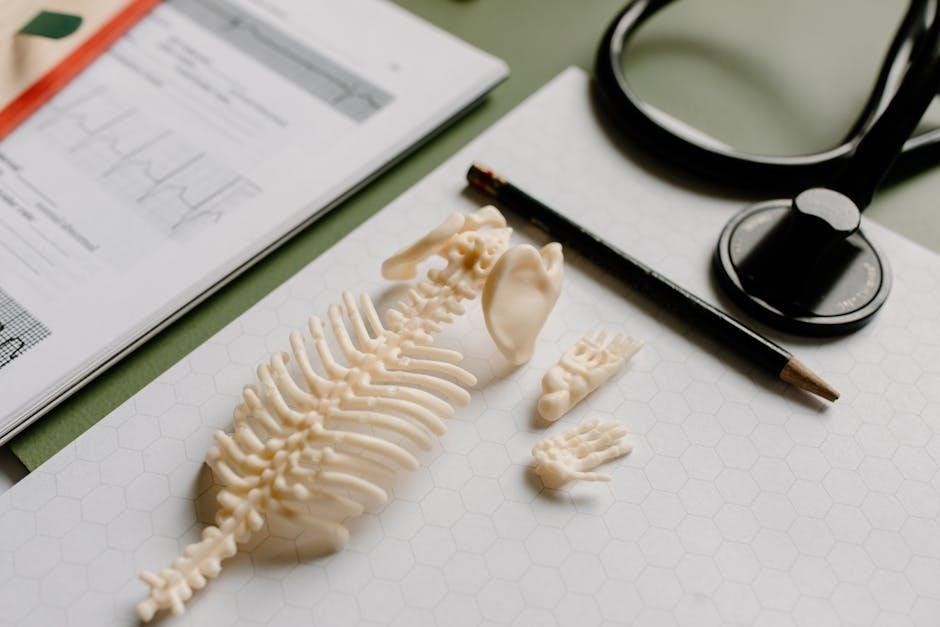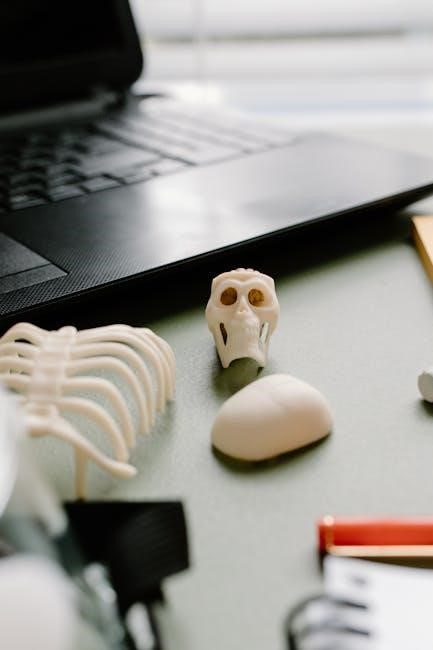This section introduces the core concepts of nursing, including its definition, evolution, and key principles. It explores the nursing process and the importance of nursing in healthcare.
1.1 Historical Development of Nursing
Nursing’s history traces back to ancient times, with caregivers providing comfort and healing. Florence Nightingale revolutionized the field, establishing modern nursing in the 19th century. The profession evolved through wartime care, public health movements, and advances in medical science. Today, nursing is a dynamic, evidence-based practice, shaped by pioneers and continuous innovation, ensuring compassionate and effective patient care across diverse settings.
1.2 The Role of Nursing in Healthcare
Nurses play a vital role in healthcare, providing direct patient care, administering medications, and educating patients on healthy practices. They assess patient needs, implement care plans, and monitor progress. Nursing involves a holistic approach, addressing physical, emotional, and social needs. Nurses collaborate with healthcare teams, advocate for patients, and adapt to diverse settings, ensuring high-quality, evidence-based care to improve patient outcomes and overall well-being.
1.3 Key Concepts and Principles
Key concepts in nursing include patient-centered care, evidence-based practice, and safe, effective interventions. Fundamental principles encompass respect for patient autonomy, dignity, and cultural diversity. Nurses adhere to ethical standards like confidentiality and beneficence. Professionalism, clear communication, and collaboration with healthcare teams are essential. These principles guide nursing practice, ensuring compassionate, holistic care that addresses the whole person—physically, emotionally, and socially.

Health-Care Delivery, Settings, and Economics
This section explores healthcare delivery systems, various care settings, and economic factors influencing nursing practice, emphasizing their impact on effective patient care and professional responsibilities.
2.1 Overview of Healthcare Systems
This section provides an overview of healthcare systems, including their structures, functions, and types, such as private, public, and community-based systems. It discusses healthcare providers’ roles, funding mechanisms like insurance and government programs, and how these systems impact patient care and nursing responsibilities. Understanding these elements is crucial for navigating the healthcare landscape effectively as a nursing professional.
2.2 Types of Healthcare Settings
This section explores various healthcare settings, including hospitals, clinics, long-term care facilities, and home healthcare. It discusses the unique characteristics, patient populations, and nursing roles within each setting. Understanding these environments helps nursing students adapt to different care delivery models and prepare for diverse clinical experiences, ensuring they are well-equipped to provide high-quality patient care in any setting.
2.3 Healthcare Economics and Nursing
This section examines the economic aspects of healthcare delivery, including resource allocation, cost containment, and nursing’s role in managing healthcare expenses. It discusses how economic factors influence nursing practice, staffing, and patient care outcomes. Understanding healthcare economics helps nurses navigate financial management strategies while maintaining quality care, ensuring efficient use of resources to meet patient needs effectively.

Ethics, Law, and Delegation in Nursing
This section covers ethical principles guiding nursing decisions, legal frameworks ensuring accountability, and delegation strategies for effective patient care management within healthcare teams.
3.1 Ethical Principles in Nursing Practice
Ethical principles such as autonomy, beneficence, non-maleficence, and justice guide nurses in decision-making. These principles ensure respect for patient rights, promotion of well-being, avoidance of harm, and fair treatment. Nurses must integrate these ethical frameworks into daily practice to provide compassionate, patient-centered care while maintaining professional integrity and accountability.
3.2 Legal Aspects of Nursing
Legal aspects of nursing involve understanding laws, regulations, and professional standards that govern practice. Nurses must adhere to patient rights, privacy, and informed consent. Proper documentation and accountability are critical to avoid legal issues. Understanding liability, malpractice, and workplace policies ensures compliance and protects both patients and nurses. Legal knowledge is essential for safe, ethical, and professional nursing care.
3.3 Delegation and Accountability
Delegation in nursing involves assigning tasks to appropriate team members, ensuring efficient patient care while respecting legal and professional boundaries. Nurses must delegate effectively, considering staff competencies and patient needs. Accountability requires nurses to take responsibility for their actions, decisions, and outcomes. Effective delegation and accountability promote safe, ethical, and high-quality care, fostering trust and professionalism in nursing practice.

The Nursing Process
The nursing process is a systematic approach to patient care, involving assessment, diagnosis, planning, implementation, and evaluation. It ensures individualized, evidence-based care.
4.1 Assessment: Collecting Patient Data
Assessment involves gathering comprehensive patient data through observation, interviews, physical exams, and lab tests. It includes measuring vital signs, identifying symptoms, and evaluating physical, psychological, and social factors. Accurate documentation ensures a baseline for care planning and ongoing evaluation. This step is crucial for identifying health issues and developing targeted interventions, laying the foundation for the nursing diagnosis and care plan.
4.2 Diagnosis: Formulating Nursing Diagnoses
Diagnosis involves analyzing assessment data to identify health problems or risk factors. Nurses formulate nursing diagnoses based on patient responses to actual or potential health conditions. These diagnoses guide the development of individualized care plans, focusing on preventing, reducing, or resolving health issues. Accurate diagnoses are essential for effective patient outcomes and tailored interventions, ensuring the care plan addresses specific needs and goals.
4.3 Planning: Setting Goals and Outcomes
Planning involves creating individualized care plans with clear, measurable goals and outcomes. Nurses set SMART (Specific, Measurable, Achievable, Relevant, Time-bound) goals based on nursing diagnoses. These goals guide interventions and ensure patient-centered care. Outcomes are prioritized to address the patient’s specific needs, promoting recovery, health maintenance, or adaptation to illness. Effective planning aligns with evidence-based practices and patient preferences.
4.4 Implementation: Executing the Care Plan
Implementation involves carrying out the care plan through interventions tailored to the patient’s needs. Nurses administer medications, perform procedures, and provide education. This phase requires clear communication and coordination with the healthcare team. Interventions are documented and aligned with established goals. Patient education focuses on treatments, self-care, and promoting adherence to the plan. Effective implementation ensures safe, evidence-based, and patient-centered care.
4.5 Evaluation: Assessing Patient Outcomes
Evaluation involves assessing whether patient goals and outcomes have been met. Nurses compare actual results with expected outcomes, documenting findings. This phase determines the effectiveness of the care plan and identifies areas for improvement. Standardized tools and clinical judgment are used to measure progress. Patient feedback is incorporated to ensure care aligns with their needs and preferences, guiding future interventions and promoting optimal health outcomes.
Vital Signs and Patient Assessment
This chapter covers essential skills for measuring vital signs, pain assessment, and conducting thorough physical examinations. Accurate data collection is crucial for effective patient care planning.
5.1 Measuring Vital Signs
Measuring vital signs is a critical nursing skill that includes assessing temperature, pulse, respiration, blood pressure, and oxygen saturation. Accurate measurement techniques are essential for detecting deviations from normal ranges. Nurses use various tools, such as thermometers, stethoscopes, and sphygmomanometers, to obtain reliable data. Regular monitoring of these signs helps in early identification of potential health issues, ensuring timely interventions and improved patient outcomes.
5.2 Pain Assessment and Management
Pain assessment involves evaluating intensity, location, and characteristics using tools like the 0-10 pain scale. Effective management strategies include pharmacological interventions, non-pharmacological methods, and individualized care plans. Nurses play a crucial role in ensuring patient comfort and quality of life by addressing pain promptly and compassionately, adhering to evidence-based practices and ethical standards.
5.3 Physical Assessment Techniques
Physical assessment involves systematic evaluation of patients using inspection, palpation, percussion, and auscultation. Nurses observe skin integrity, vital signs, and body systems to detect abnormalities. Accurate documentation and reporting are crucial for diagnosis and care planning. These skills are essential for identifying health deviations and monitoring patient progress, ensuring comprehensive and individualized care.

Nursing Skills and Procedures
Nursing skills and procedures are essential for providing quality patient care. This section covers fundamental techniques, infection control, and medication administration, enhancing clinical competence and patient safety.
6.1 Basic Nursing Skills
Mastering basic nursing skills is foundational for effective patient care. These skills include vital sign measurement, patient assessment, and fundamental care activities. Proper techniques ensure patient safety and comfort. This section covers essential competencies, such as recording accurate data, performing physical assessments, and maintaining asepsis. Developing these skills builds a strong clinical foundation, enabling nurses to deliver high-quality care confidently and efficiently in various healthcare settings.
6.2 Infection Control and Safety Measures
Infection control is critical to preventing the spread of diseases. Key measures include hand hygiene, use of personal protective equipment (PPE), and proper sterilization techniques. Safety protocols ensure a secure environment for both patients and healthcare workers. This section emphasizes adherence to infection control guidelines and best practices to minimize risks and promote a safe care setting. Proper training and vigilance are essential components.
6.3 Medication Administration
Medication administration requires accuracy and adherence to the “5 rights”: right medication, right dose, right time, right route, and right patient. Nurses must assess patients before administering drugs, educate them on side effects, and monitor for adverse reactions. Proper documentation is essential. This section provides guidance on safe practices, including handling high-alert medications and using barcode scanning systems to reduce errors. The study guide offers practice exercises to reinforce these critical skills.

NCLEX Preparation and Practice Questions
This section focuses on strategies to excel in the NCLEX exam, including practice questions, case studies, and NGN-style questions, ensuring comprehensive preparation for nursing students.
7.1 NCLEX Exam Format and Strategies
Understanding the NCLEX exam format is crucial for success. The exam includes multiple-choice questions, case studies, and Next Generation NCLEX (NGN)-style questions. Effective strategies involve active learning techniques, time management, and focused study on high-priority topics. Regular practice with NCLEX-style questions helps build critical-thinking and problem-solving skills, essential for mastering the exam. This section provides detailed insights and proven methods to enhance preparation and confidence.
7.2 Multiple Choice Questions and Case Studies
This section offers a comprehensive collection of multiple-choice questions and case studies designed to simulate real-world scenarios. These exercises focus on key nursing concepts, critical thinking, and problem-solving skills. Each question is structured to reflect NCLEX exam patterns, aiding students in assessing their knowledge and identifying areas for improvement. Case studies provide practical applications, enhancing clinical judgment and decision-making abilities effectively.
7.3 NCLEX-Style Questions in Each Chapter
Each chapter includes NCLEX-style questions to help students apply knowledge and prepare for the exam. These questions cover clinical scenarios, prioritization, and patient-centered care. Updated with Next Generation NCLEX (NGN) formats, they focus on critical thinking and decision-making. Answers and rationales are provided for self-assessment, ensuring students master key concepts and develop exam confidence effectively.

Flashcards and Memory Aids
Flashcards cover key nursing concepts and mnemonics, aiding memorization and retention. Digital flashcards and memory techniques enhance study efficiency and accessibility for nursing students.
8.1 Key Nursing Concepts
Flashcards focus on essential topics like assessment, diagnosis, and care planning. They simplify complex information, reinforcing vital signs, patient symptoms, and fundamental skills. Digital formats allow easy access and self-testing, helping students master critical concepts efficiently for exams and clinical practice.
8.2 Mnemonics and Memory Techniques
Mnemonics and memory techniques are powerful tools for retaining nursing knowledge. Common methods include acronyms, rhymes, and association techniques. These strategies help students remember complex information, such as NCLEX-style questions and key principles. By using mnemonics, learners can enhance their critical thinking and problem-solving abilities, ensuring better retention and application of nursing concepts in clinical settings.
8.3 Flashcard Index and Digital Resources
The flashcard index provides quick access to key nursing concepts, while digital resources like eBooks and online tools enhance learning. These resources include interactive flashcards, practice questions, and digital pages for flexible study. They complement traditional study materials, offering a comprehensive approach to mastering nursing fundamentals and preparing for exams like the NCLEX.

Learning Activities and Review Exercises
Engage with review questions, exercises, and interactive activities to reinforce learning. These tools help integrate knowledge and apply concepts to real-world nursing scenarios effectively.
9.1 Review Questions and Exercises
This section provides a variety of review questions, including multiple-choice, true/false, and case studies. Designed to reinforce key concepts, these exercises focus on critical thinking and application of nursing knowledge. Each chapter includes NCLEX-style questions to help prepare for exams. The exercises cover fundamental nursing topics, ensuring a solid understanding of essential skills and principles. Regular practice with these tools enhances problem-solving abilities and clinical judgment.
9.2 Learning Activities and Critical Thinking
Engage in interactive learning activities designed to enhance critical thinking and problem-solving. These exercises include clinical simulations, case studies, and group discussions. They focus on applying theoretical knowledge to real-world scenarios, fostering analytical skills and decision-making. Activities are structured to encourage collaboration and reflective practice, preparing students for the complexities of patient care and professional challenges in nursing.
9.3 Practice for Problem-Solving Skills
Sharpen your ability to analyze clinical scenarios and develop effective solutions. Exercises include NCLEX-style questions, case studies, and interactive simulations. These tools help you apply theoretical knowledge to real-world challenges, enhancing your decision-making abilities. Regular practice builds confidence and prepares you to address complex patient care issues with clarity and precision, ensuring safe and effective nursing interventions.

Table of Contents and Chapter Structure
This section outlines the organization of the study guide, detailing chapter topics and key content areas. It provides a clear roadmap for navigating the material effectively.
10.1 Organization of the Study Guide
The study guide is divided into chapters, each focusing on specific nursing topics. Sections include fundamentals, healthcare delivery, ethics, and NCLEX preparation. Each chapter contains review questions, exercises, and learning activities to reinforce understanding. The guide also features flashcards and digital resources for enhanced study. This structured approach ensures comprehensive coverage of essential nursing concepts and skills.
10.2 Chapter Highlights and Key Topics
Each chapter highlights essential nursing concepts, such as patient assessment, care planning, and ethical practices. Key topics include vital signs measurement, infection control, and medication administration. The guide emphasizes critical thinking and problem-solving skills through NCLEX-style questions and case studies, ensuring a well-rounded understanding of nursing fundamentals.
10.3 Integration of Knowledge and Practice
The study guide bridges theoretical knowledge with practical application, ensuring learners can apply concepts to real-world scenarios. Through review questions and exercises, students integrate essential nursing principles into clinical decision-making, fostering critical thinking and effective patient care. This approach prepares future nurses to confidently transition from classroom to clinical settings, applying their knowledge seamlessly in diverse healthcare environments.
Additional Resources and References
Explore recommended textbooks, eBooks, and online tools for nursing education. Utilize digital resources, including flashcards and study guides, to enhance learning and prepare for exams effectively.
11.1 Recommended Textbooks and eBooks
Enhance your learning with the Study Guide for Fundamentals of Nursing, 12th Edition, featuring updated NGN-style questions. The Fundamentals Flashcards and Nursing School Bundle offer comprehensive digital resources. Access eBooks like Fundamentals of Nursing through platforms like Vitalsource for interactive learning. These resources provide essential concepts, procedures, and practice questions to support nursing education and exam preparation effectively.
11.2 Online Resources and Study Tools
Utilize online platforms like Quizlet for flashcards on nursing concepts. Access NCLEX-style questions and digital flashcards from Nurse in the Making. The Fundamentals of Nursing Flashcards and Nursing School Bundle offer comprehensive digital resources, including interactive eBooks and practice exams. These tools enhance learning, critical thinking, and exam preparation, providing 24/7 access to study materials and interactive content.
11.3 Nursing School Bundle and Digital Pages
The Nursing School Bundle offers a comprehensive collection of digital resources, including eBooks, flashcards, and practice questions. It features a 2025 Edition with 39 digital pages, covering essential topics for exams like NCLEX, ATI, and HESI. This bundle integrates with online study tools, providing a seamless learning experience and ensuring students stay updated with the latest nursing practices and study materials.

Final Tips for Success
Mastering fundamentals of nursing requires consistent practice and effective study habits. Utilize the study guide for structured learning and stay updated with the latest nursing practices to ensure success.
12.1 Effective Study Habits
Developing effective study habits is crucial for mastering the fundamentals of nursing; Create a structured study schedule, prioritize active learning, and review key concepts regularly. Utilize the study guide for focused practice with NCLEX-style questions and exercises. Incorporate flashcards for quick recall of essential terms and concepts. A quiet, organized study environment and regular breaks can enhance productivity and retention. Consistency and self-assessment are key to long-term success.
12.2 Time Management and Exam Strategies
Effective time management is essential for success in nursing studies. Prioritize tasks, allocate specific blocks for each topic, and use a planner to stay organized. Practice with timed exercises and NCLEX-style questions to build exam readiness. Review test formats to understand question structures and focus on weak areas. Stay calm during exams, manage your time wisely, and review answers if possible. Consistent practice and strategic planning lead to better outcomes.
12.3 Staying Updated with Nursing Practices
Continuous learning is crucial in nursing. Stay updated with the latest practices by accessing current textbooks, eBooks, and online resources. Engage in workshops, webinars, and professional communities to expand knowledge. Utilize digital tools and flashcards for quick reviews. Evidence-based practices and new guidelines ensure safe and effective care. Regularly review updates from reputable sources to maintain competency and adapt to evolving healthcare needs.
